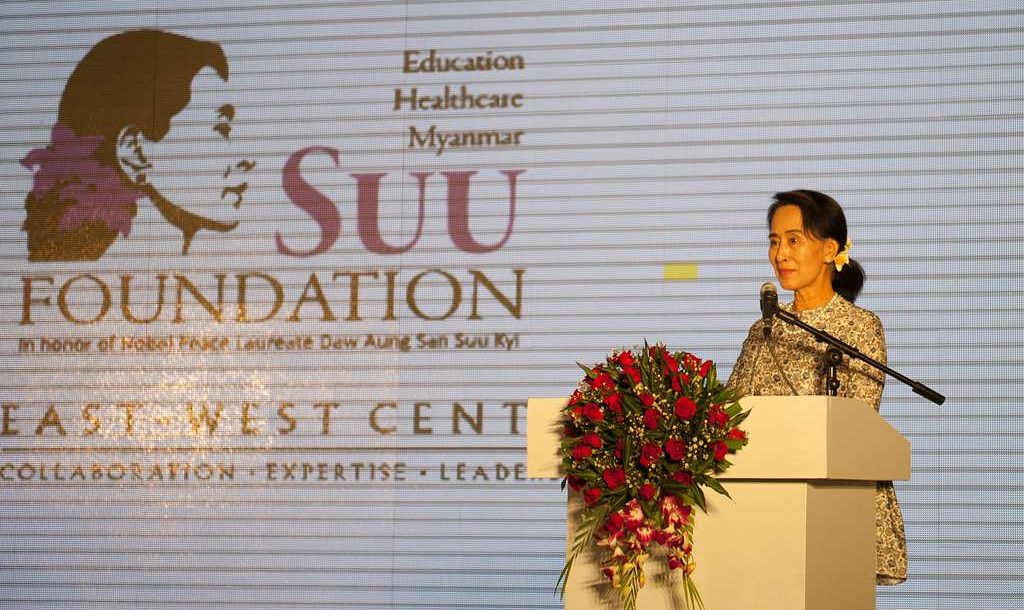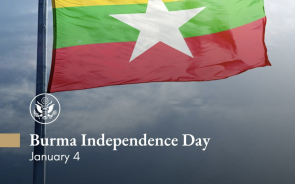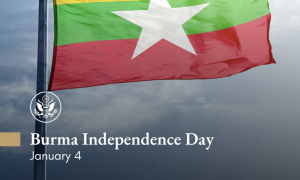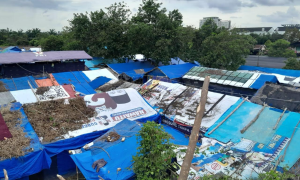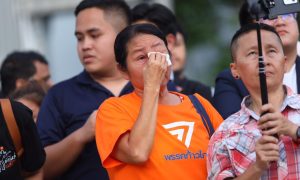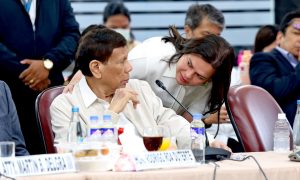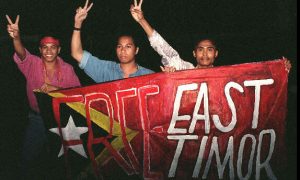Nick Cheesman’s recently published book, Myanmar: A Political Lexicon, examined particular Burmese words and phrases as they are applicable in the current sociopolitical context. It stressed the need to be careful about employing various terms, in both Burmese and English, when writing about contemporary Myanmar. Inspired by Nick’s book, the first part of this article looked briefly at the protocols affecting formal titles and designations. This follow-on piece is more concerned with personal names.
All Burmese names are particular. Most people do not have surnames or forenames (“Christian” names) in the Western sense. Names may be one to four syllables long, and are often chosen depending on the day of the week that a child is born. This is why many people in Myanmar share the same names. Needless to say, over the years this practice has made the compilation of a Myanmar telephone book a challenging task. Correspondence sent to someone working in a large organisation usually needs to be addressed to them with an added identifier, such as “Khin Maung (No.7)”, or “Maung Maung (Procurement)”. Cases of mistaken identity are common.
Occasionally, a child’s name may derive from those of its parents, as appears to be the case with regard to opposition leader Aung San Suu Kyi. “Aung San” comes from her father, independence hero Aung San, who was assassinated in 1947. “Suu” is said to come from her paternal grandmother and “Kyi” reportedly derives from her mother’s name, Khin Kyi. Past military regimes have sought to reduce Aung San Suu Kyi’s claim to these impeccable historical credentials by referring to her simply as “Suu Kyi” or “Ma Suu Kyi”, even Mrs Aris (her British husband’s surname). To her loyal followers, she is “Daw Suu” (Aunty Suu) or “Amay Suu” (Mother Suu).
Also, among the majority Bamar ethnic group names are usually preceded by an honorific, such as “U”, literally meaning “uncle”, or “Daw”, meaning “aunt”. Sometimes, it can be so closely associated with an individual that it is mistaken for part of his name, as was the case with Prime Minister U Nu. “U” can also form a part of a man’s name, as in U Tin U (also spelt Oo). The titles “Maung”, “Ko” (“brother”) and “Ma” (“sister”), usually given to younger men and women, are also found in personal names, as in Maung Maung Aye, Ko Ko Gyi and Ma Ma Lay. Some men adopt “Maung” as a sign of modesty, like the eminent historian and former Vice-Chancellor of Rangoon University Maung Htin Aung, whose birth name was Htin Aung.
There are other honorific titles, which are occasionally mistaken for personal names. For example, respected elders are often known by the title Saya (literally “teacher”), Sayagyi (“great teacher”) or, if female, Sayama. Senior Buddhist monks, such as the abbot of a monastery, are referred to as Sayadaw. Eminent personalities, teachers and ascetics credited with special powers can carry titles like Bodaw, Medaw or Dhamika. Military officers or distinguished former soldiers may be referred to as Bo. Some may have been awarded gallantry medals carrying titles like Thiha Thura. In English this means “brave lion”.
There is also a wide range of civil awards and honours, acknowledging outstanding service to the country, which carry specific titles. Some are more deserved than others. In 2022, for example, Senior General Min Aung Hlaing, the current junta leader, awarded himself the Thadoe Thiri Thudhamma (Most Glorious Order of Truth) and the Thadoe Maha Thray Sithu (Order of the Union of Myanmar). It now seems to be a requirement to refer to the Senior General by his military rank and all his civil titles whenever he is named in official announcements or the state-controlled news media.
Some of Myanmar’s ethnic minorities, like the Kachin, have family or clan names, which are placed before their given names, as in the case of Maran Brang Seng, where “Maran” is the name of a clan (or, strictly speaking, a sub-clan). Kachin leaders are often known by the title Duwa, literally meaning “big man”. Other ethnic minorities, such as the Mon, Kayin (Karen), Shan, Karenni and Chin have their own systems of honorifics and naming conventions. In the S’ghaw Kayin language, for example, “Saw” and “Naw” are broadly the Kayin equivalents of the Bamar titles “U” and “Daw”. In Shan the corresponding male term is “Sai” and in Mon it is “Nai”.
In Myanmar, personal names can be changed relatively easily, often without seeking official permission or requiring formal registration. This situation is further complicated by the frequent use of nicknames and other sobriquets as identifiers, such as “Moustache” Maung Lwin, “MI” (military intelligence) Tin Oo, Theippan (writer) Maung Wa, “Myanaung” (the town) U Tin, Tekkatho (university) Phone Naing, or “Guardian” (the magazine) Sein Win. Nicknames given during someone’s youth can persist into adulthood. Animists may give a young child an unpleasant name to keep away malevolent spirits, sometimes marking that person for life.
Some Myanmar citizens were given or have adopted Western names. These include older people who attended Christian missionary schools in their youth, where such names were often handed out by teachers without prior consultation with either the children or their parents. Other Burmese use only one part of their name for convenience, for example when travelling abroad or dealing with foreigners who are unfamiliar with the country’s complex naming systems. It is not uncommon for an obituary to list more than one name by which the deceased was known.
Also, pen-names and pseudonyms have a long history in Myanmar. For example, during the last century activist writers often used noms de plume to escape identification and arrest by the British colonial authorities, or later military regimes. Foreigners too have resorted to pseudonyms, perhaps the most famous being Eric Blair (a.k.a. George Orwell), author of Burmese Days. More recently, foreign critics of the military regime have used pen names to avoid being blacklisted and denied entry to the country. For example, “Emma Larkin”, the celebrated author of Secret Histories, is the pen name of an American journalist.
Throughout Myanmar’s history, noms de guerre have also been common. For example, the birth name of General Ne Win, who effectively ruled the country from 1962 to 1988, was Shu Maung. Ne Win, which means “bright sun” (or “brilliant as the sun”) in Burmese, was a nom de guerre he adopted in 1941 and retained after the Second World War, probably to hide his mixed Chinese ancestry. Many members of the armed groups currently fighting the military regime have adopted noms de guerre to protect themselves and their families from retribution by the junta.
It is common among Myanmar’s armed forces (and indeed Myanmar society as a whole) for prominent figures to be given nicknames, many of which, while familiar and amusing, can also be quite respectful. For example, until he was pushed sideways by the new military regime in 1988, General Ne Win was often referred to by members of the Tatmadaw, and many of his civilian supporters, as Apho Gyi, meaning (in this context) “the old man”, or “the big guy”. He was also widely known (in English) as “Number One”, although this was not always out of respect or affection. Behind Ne Win’s back, the powerful intelligence chief Colonel Tin Oo was called “Number One and a Half”.
During the days of the State Law and Order Restoration Council (SLORC), and after 1997 its nominal successor, the State Peace and Development Council (SPDC), regime leader Senior General Than Shwe was widely known to his troops as Aba Gyi, meaning “grandfather” or “great father”. He too was sometimes called “Number One”, even after his formal retirement from the Tatmadaw in 2011. Than Shwe’s long time deputy, Vice Senior General Maung Aye, was popularly known (at least in the army) as Aba Aye, or “father Aye”.
Individual military and police officers have attracted a range of derogatory nicknames. For example, when he was a cadet at the Defence Services Academy in the 1970s, Min Aung Hlaing was dubbed kyaung chee (“cat-shit”) by his fellow cadets. This was a reference to something deposited quietly but leaving a terrible smell. After the 2021 coup, Min Aung Hlaing’s opponents soon advertised the fact that, with a slight tonal shift, his initials in Burmese, Ma Ah La, translated as “mother-fucker”. Since extending a national State of Emergency for the fifth time in January 2024, he has been called Toe, which in Burmese means “extend” or “renew”.
Other notorious military officers have attracted similar nicknames. For example, after brutally crushing student protests in 1962, then Lieutenant Colonel, and later President, Sein Win was dubbed “The Butcher of Rangoon”. Following negotiations in 1997 with the drug-trafficking ethnic Wa community, then Lieutenant General Khin Nyunt was dubbed Foe Khin Nyunt, or “Number Four [heroin] Khin Nyunt”. Later, when Chief of Intelligence, he was known (in English) as “the Prince of Darkness”, or the “Prince of Evil”. For his role in suppressing the nation-wide “Saffron Revolution” in 2007, SLORC Chairman Senior General Than Shwe became known as Shwe wah yung lu that thamar Than Shwe, or “monk-killer” Than Shwe.
There are of course other terms, reflecting popular sentiments. Military intelligence officers, for example, are known on the street as kwe (“dogs”), sit kwe (“military dogs”), amair like kwe (“hunting dogs”), or kwe yu (“mad dogs”), among other epithets. According to the anthropologist Monique Skidmore, the latter name arose because night-time raids by intelligence officers on the homes of pro-democracy activists invariably set the local pi dogs barking. For decades, members of the police force have been called kywe, or “rats”, by their detractors. Tatmadaw soldiers call members of Kayin resistance groups nga pway (“ringworms”), among other things, as a calculated insult.
Informers, both paid and unpaid, are popularly known as dalan, although this word has occasionally been translated into English as “spies”. Anti-regime elements who are accused of being “traitors”, “lackeys of the colonialists”, “agents of a foreign power”, “puppets” or “Western stooges”, have been labelled pasein yo in official speeches and stories in state-controlled news media outlets like the New Light of Myanmar. The term is usually translated into English as “axe handles”. This is an apparent allusion to those Burmese nationals or organisations that purportedly support foreigners (the “axe heads”) in their opposition to the military government and, ipso facto in its view, the country.
Another label commonly used by both sides of the political divide (including in popular culture, like songs and movies) is thit sar phauk, literally someone who breaks a legal promise (of allegiance), hence “traitor” or “betrayer”. Those who change their views depending on the audience, or prevailing political climate, have been dismissed as thar ku, or opportunists.
Those Burmese of South Asian ancestry and members of the Rohingya community, indeed all Muslims in Myanmar, are routinely called kalar. This was once a descriptive term for foreigners. During the colonial period, for example, Caucasians were known as kalar pyu, or “white kalar” and foreign women as kalar ma. However, the word has always had perjorative overtones. For example, the SLORC and SPDC tried to shame Aung San Suu Kyi by accusing her of disloyalty for marrying a foreigner or, in their words, a kalar pyu. In 2017, Facebook decreed that use of kalar constituted hate speech and banned it from the platform.
Many pundits, journalists and activists writing about contemporary events in Myanmar do not seem to bother too much about the niceties of names and titles, simply employing whatever words are most commonly used in their own circles, or which reflect their particular political views. Scholars and officials, however, are required to be scrupulously accurate and objective, and thus need to be more circumspect. This can lead at times to cumbersome language, the pedantic use of footnotes or long explanations carefully describing what suite of official titles is being used, and why.
This may seem tiresome to some, but the field of Myanmar studies is heavily sown with factual, political and moral landmines, all threatening to explode should terms deemed inaccurate or inappropriate by one side or another be used. Not so very long ago, the use of “Myanmar” rather than “Burma” was enough to cause eruptions in the activist community, in one case including death threats. As noted earlier, even governments have become caught up in such controversies, causing diplomatic incidents.
Thus, harking back to Confucius 2,500 years ago, the correct use of names is one among the many challenges of writing about this deeply troubled, but fascinating country.
 Facebook
Facebook  Twitter
Twitter  Soundcloud
Soundcloud  Youtube
Youtube  Rss
Rss 